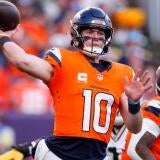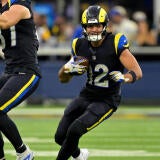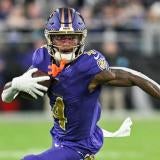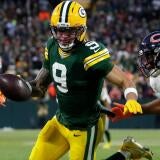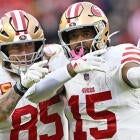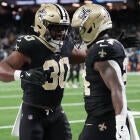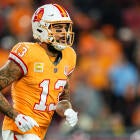2017 Fantasy Football Draft Prep: Running back breakdown for every NFL team
Who are the starters? Who are the sleepers? Our Dave Richard surveys the backfields around the league and tells you how to handle them on Draft Day.

Want stud running backs early? Two of your first three picks should go to the position. Want to wait so you're loaded at quarterback, receiver, etc.? There's a script for that too. Something in between? No problem, it can be done.
Your game plan for landing running backs will shape your Draft Day strategy. Every other position falls into place from there.
This is our attempt to check out every team's running back situation and give you our best take on who the best ones are on each team. Some are obvious -- you don't need an explanation why Ezekiel Elliott is the best back in Dallas -- and some are tough. Injuries along with poor training camp and preseason performances will ultimately shape who plays where and when, but we'll still give you an edge your opponents won't have when it comes to taking rushers on Draft Day.
THE OBVIOUS
These are the names you know and the running backs with starting jobs wrapped up already because they're so good.
Arizona: David Johnson (Round 1); projected backup: A. Ellington/K. Williams (FA)
Buffalo: LeSean McCoy (Round 1); projected backup: Jonathan Williams (Round 10+)
Chicago: Jordan Howard (Round 1-2); projected backup: Jeremy Langford (Round 13+)
Dallas: Ezekiel Elliott (Round 1); projected backup: Darren McFadden (Round 12+)
Houston: Lamar Miller (Round 2-3); projected backup: D'Onta Foreman (Round 11+)
Jacksonville: Leonard Fournette (Round 2); projected backups: C. Ivory/T. Yeldon (FA)
L.A. Rams: Todd Gurley (Round 2-3); projected backups: M. Brown/L. Dunbar (FA)
L.A. Chargers: Melvin Gordon (Round 1); projected backups: B. Oliver/A. Williams (FA)
Miami: Jay Ajayi (Round 2); projected backups: D. Williams/K. Drake (FA)
Pittsburgh: Le'Veon Bell (Round 1); projected backup: James Conner (Round 11+)
Tennessee: DeMarco Murray (Round 2); projected backup: Derrick Henry (Round 7)
FROM TANDEM TO TOP DOG?
Carolina: Christian McCaffrey (Round 4-5) and Jonathan Stewart (Round 8-10)
The Panthers' move to a more creative offense will put McCaffrey on the field a bunch while minimizing Stewart's role and touches. Expect McCaffrey to handle around eight carries and five catches per game while Stewart falls short of those total touches every week but still be a force in the red zone.
Plan: McCaffrey is one of this season's most high-risk, high-reward running backs. He's going to be a top 60 pick in every draft but will need a lot of yards every week to be a reliable No. 2 Fantasy rusher. Having Stewart around could curb his production, yet Stewart wouldn't be usable in Fantasy as anything but a touchdown-or-bust running back. Just stick with McCaffrey and hope for the best.
Cincinnati: Joe Mixon (Round 4-5), Jeremy Hill (Round 9-10) and Giovani Bernard (Round 12+)
After two years of frustrating production, Fantasy owners should be excited about Mixon's arrival to Cincinnati. This is the same place that once gave Hill a big opportunity as a rookie when the Bengals' other backs stalled. Now Hill is the one who's stalling while Bernard is coming back from a torn ACL. While we expect Hill to keep a decent role, Mixon is their most versatile, explosive back. It's a matter of time until he's getting close to 20 touches per game.
Plan: Draft Mixon after 45th overall with the long-term in mind. Maybe he begins the year with limited work but eventually he should be the Bengals' best back. Hill would be the handcuff, though he might not be as desirable given how he's performed the past two seasons.
Cleveland: Isaiah Crowell (Round 3-4) and Duke Johnson (Round 10+)
Playing behind a much-improved offensive line, expect the Browns to lean on Crowell for everything except obvious passing situations. That's not to say Crowell can't catch -- he had 40 grabs last season and played a role in come-from-behind games, a good omen for when the team is trailing in 2017.
Kansas City: Kareem Hunt (Round 6) and Spencer Ware (Round 7)
The Chiefs had no choice but to plug Ware into the run game in 2016 after Jamaal Charles couldn't get on the field. They have a choice this year after moving up in the third round to get Hunt. Andy Reid's track record with running backs is good, and Hunt has more versatility and a bit more speed than Ware. Once the coaches feel Hunt knows his assignments, don't be surprised to see him dominate touches.
Plan: It's better to splurge for Hunt than settle for Ware, even though they'll probably get drafted within 15 picks of each other. Getting both would mean spending Round 6 and 7 picks -- it's worth it if they combine for your No. 2 running back spot.
Zero RB: If either Chiefs running back makes it to Round 8 or beyond, snap 'em up.
Minnesota: Dalvin Cook (Round 5), Latavius Murray (Round 8-9) and Jerick McKinnon (FA)
It's early, and the Vikings are known for not putting their rookies out on the field until they're absolutely ready, but Cook is shaping up to be the dominant back in Minnesota. Part of it has to do with Murray's ankle keeping him from even practicing, but even if Murray were healthy he'd be exposed as a less dynamic back than Cook. McKinnon's pushing for a role after finishing strong last season.
Plan: If you use common sense, you'll realize Murray only did so well in Oakland because of his touchdown binge. Maybe that continues, but he'll have to prove himself fit for football first. Cook already has impressed during minicamp and seems like a lock to handle 15 touches per game right out of the gate.
N.Y. Jets: Bilal Powell (Round 7-8) and Matt Forte (Round 9-10)
Powell's late-2016 surge made him a favorite in Fantasy circles and presumably among his coaches. With the sun setting on Forte's career, Powell offers relative youth (28) and speed -- NFL teams usually gravitate toward those qualities. The Jets also figure to play from behind a lot, giving Powell (and Forte) plenty of receiving opportunities.
Plan: Powell will be an attractive option in PPR leagues and standard formats alike. Though the Jets haven't given any indication they'll lean on him as their lead back, common sense suggests he'll be their top dog. Forte will provide depth for the Jets and for Fantasy owners too.
Zero RB: Powell, especially in PPR formats. He had 90 points in PPR formats over his last four games in '16.
(MOSTLY) CLEAR-CUT COMMITTEES
Atlanta: Devonta Freeman (Round 2) and Tevin Coleman (Round 5-6)
The Falcons did a nice job using both backs last season, though Freeman had a little more than 17 touches per game versus Coleman's 11.5. The only way that changes is if Freeman's play falls off, which didn't happen last year and doesn't seem predictable this year.
Plan: Freeman can be drafted without Coleman, though in a perfect world you'd get both. Spending a pick in Round 2 and again in Round 5 or 6 for one running back spot is just not worth it. Getting Freeman and Coleman in an auction would be an easier task.
Baltimore: Danny Woodhead (Round 8), Kenneth Dixon (Round 8-9), Terrance West (Round 10)
The Ravens replaced pass-catching Kyle Juszczyk with Woodhead, and while they'll have different roles, it's Woodhead who offers more explosiveness. He's locked into at least a passing downs role all season. West will begin the year as the Ravens' run-downs back -- if he does well through the first four weeks, he'll keep going. If not, Dixon will come back from a four-game suspension and take over.
Plan: In PPR, Woodhead is more of a Round 6 pick and a sure-fire starter. He's trickier in non-PPR but still should be the most reliable Ravens back throughout the season. His value shouldn't be impacted much by Dixon or West, whose values figure to fluctuate during the season.
Zero RB: Woodhead is one of the best in PPR formats -- target him for sure. In standard-scoring leagues, West offers the most value, especially since he'll play four games without Dixon.
Denver: C.J. Anderson (Round 5), Jamaal Charles (Round 10+), Devontae Booker (FA) and DeAngelo Henderson (FA)
The Broncos' backfield hinges on Anderson. His size and strength are perfect for the power run offense the Broncos are expected to use this year. He has battled injuries throughout his career, particularly to his knee, which is why the Broncos have Charles, Booker and Henderson waiting in the wings. Charles particularly could be used as a part-time back even when Anderson's healthy.
Plan: Nothing's wrong with getting Anderson in Round 5 as long as you're familiar with the risk. The trouble is getting the right back to handcuff him with -- Booker seems to be that guy because Charles isn't viewed as an every-down back anymore and Henderson has to battle in camp for reps. He'd be the late-round band-aid to have.
Zero RB: Booker and Henderson are late, low-risk fliers who require patience but can morph into Fantasy heroes if Anderson can't stay upright.
Green Bay: Ty Montgomery (Round 6), Jamaal Williams (Round 6-7), Aaron Jones (FA) and Devante Mays (FA)
The Packers spent three draft picks on running backs, creating some much-needed depth. The rookie with the most potential to dominate this backfield is Williams, who has a good all-around skill set and especially has the bulk that Montgomery and the others just don't have. Montgomery should reprise his role from last year of being a decent 10-touch-a-week option.
Plan: In non-PPR, we'd skip Montgomery in Round 6 and take Williams in Round 7 on the hunch he outplays Jones and Mays in camp. Williams would settle into a split with Montgomery to begin the year, but his size could give him the edge as a goal-line guy. From there he could develop into the lead back in this awesome Packers offense.
Zero RB: Williams is your man for the reasons listed above. In PPR leagues you could use your last pick on Jones.
Indianapolis: Frank Gore (Round 7-8), Marlon Mack (Round 9-10) and Robert Turbin (FA)
The only people who think Gore has a lot left in the tank are the Colts coaches and front office. They didn't try too hard to replace him, only drafting Mack in the fourth round and keeping Turbin on hand. Signs point to Gore handling the primary rush job with Mack beginning the year as a change-of-pace back.
Plan: No one wants to draft Gore; people end up settling for him. After 75th overall, he's a good value. Mack has tons of potential given his speed and the old man ahead of him on the depth chart, which is why it's wise to take him two rounds after getting Gore.
Zero RB: Mack fits the bill perfectly. He might begin the year on your bench, but if Gore slows down or misses playing time, Mack figures to have the best shot at replacing him given his skill set.
New England: Mike Gillislee (Round 4-5), James White (Round 11+), Dion Lewis (Round 11+) and Rex Burkhead (FA)
The Patriots are making it harder on everybody to predict their run game. Gillislee is most likely to replace Blount as the primary rushing back while Lewis and Burkhead can provide change-of-pace options. White is their best bet in passing situations, though Lewis and Burkhead can also fill that role.
Plan: Bill Belichick's been rare to hand out money for running backs, but he green-lighted $4 million to be spent on Gillislee this season alone. That should mean something. He's a risk worth taking knowing you'll be able to land one more Patriots back later in the draft (Lewis makes the most sense as a handcuff).
Zero RB: In PPR, James White is a fantastic choice in the middle rounds. We could see Lewis or Burkhead emerge as other late-round targets during the preseason.
New Orleans: Mark Ingram (Round 4), Adrian Peterson (Round 8-9) and Alvin Kamara (FA)
Mark Ingram has the starting job until he fumbles it away or until Peterson finds the fountain of youth. After bottoming out last season with the Vikings, Peterson has an uphill climb to prove to his coaches he can hold up as a lead back. The most likely scenario to begin the year is for Ingram to continue as the lead back, Peterson to fill in for around 10 carries a game and Kamara to catch a few passes.
Plan: Figure Ingram will be an unpopular pick, but by Round 4 there won't be many desirable running backs left. Ingram's track record over the past few seasons should inspire some hope. Drafting Peterson later on as a handcuff for Ingram locks up this backfield for whatever might happen.
Zero RB: Peterson qualifies since he should be available around pick No. 100, but he's a short-term fix.
Oakland: Marshawn Lynch (Round 5), DeAndre Washington (Round 12+) and Jalen Richard (Round 12+)
Believing Lynch as the Raiders' lead running back is simple. Expecting him to play well and stay healthy for 16 games after coming out of retirement is a harder sell. Assuming the Raiders are wise, they'll judiciously use Lynch while giving Washington and Richard a handful of reps each week. It could mean 15 touches per game for Lynch, which isn't too far from what Latavius Murray had last year.
Plan: Lynch as a No. 2 Fantasy running back is a little nerve-racking. If you get him as a prime No. 3 or flex, you should be happy. If someone takes him before Round 5, it's a mistake. Training camp will reveal which running back is his backup, but the hunch here is Washington's well-rounded game gives him the edge.
San Francisco: Carlos Hyde (Round 3-4), Joe Williams (Round 9-10) and Tim Hightower (Round 12+)
Hyde has the most potential of any 49ers running back, but he's not necessarily a fit for the offense Kyle Shanahan is installing. Williams, a rookie from Utah, fits perfectly. He can make great cuts and has enough burst to pick up big gains. Hightower also is a fit and worked with Shanahan back in 2011.
Plan: Hyde heads into training camp as the 49ers starter, but it doesn't mean he'll keep the job all year. Furthermore, Shanahan has done well using multiple running backs as evidenced by his work in Atlanta, so don't expect Hyde to work alone. It's OK to take Hyde, but spending on Williams later seems like a very smart move.
Zero RB: So long as he impresses through training camp and the preseason, Williams will be a target. Problem is, if he's too good he won't be available in Round 9 or 10.
Seattle: Eddie Lacy (Round 5-6), Thomas Rawls (Round 10+) and C.J. Prosise (Round 12+)
Pete Carroll brought Lacy to Seattle to jump start his power run game. In the past big guys like LenDale White and Marshawn Lynch played bullying roles in Carroll's scheme, and he thinks Lacy can be the same. Rawls, who is finally healthy after year-long injury issues, will push Lacy for playing time while Prosise seems best suited as a passing-downs back.
Plan: Despite two years of disappointing production, there are still people ready to draft Lacy. Admittedly, there is potential, but the closer you get to taking him in Round 6, the better. Rawls should be an easy pick four rounds later as a handcuff.
Zero RB: Skip Lacy and go for Rawls. His draft price tag is too cheap to ignore, especially since his only competition for playing time is Lacy. In PPR, Prosise also makes a lot of sense in the double-digit rounds.
Tampa Bay: Doug Martin (Round 6-7), Jacquizz Rodgers (Round 9-10) and Charles Sims (FA)
The Bucs haven't gotten rid of Martin yet, opening the door for him to come back and handle a sizable part of the run game after his three-game suspension. Until then, Rodgers assumes the primary role with Sims in passing situations.
Plan: Martin is worth the Round 6 risk, but getting Rodgers a few rounds later should give Fantasy owners at least one starting running back each week.
Zero RB: Rodgers can be had late and conceivably start for Fantasy owners through matchups at Miami, vs. Chicago and at Minnesota.
RBs THAT MAKE YOU SICK
Detroit: Ameer Abdullah (Round 5-6), Theo Riddick (Round 10+) and Zach Zenner (FA)
The Lions are committed to using multiple backs, particularly since the coaches don't have the confidence to give one an overwhelming majority. We should see Abdullah as the primary guy, Riddick in passing situations and Zenner as a backup to both and potentially a goal-line guy.
Plan: None of the above. Because so many backs will play, they'll eat into each other's stats and come up with disappointing Fantasy results. Abdullah will be popular because he's flashy, but there won't be a big role for him unless injuries knock out other Lions rushers (or until Abdullah becomes the next Barry Sanders).
Zero RB: Riddick is an obvious choice in PPR -- he's averaged 5.1 catches per game over the past two seasons.
N.Y. Giants: Paul Perkins (Round 5-6), Wayne Gallman (FA) and Shane Vereen (FA)
The Giants did almost nothing to improve their run offense, suggesting they're perfectly fine with Perkins as their primary back to lead the season. He was a little better than average in his final five games last year, including the playoffs, but he didn't score and had one game with over 100 yards. Gallman provides a physical punch and Vereen brings an excellent passing downs pedigree. Everything sets up for the Giants to use multiple backs all year.
Plan: Steer clear of this group. Perkins is going to be popular on Draft Day, but it has more to do with what his role might be and where he's playing than anything else. While he might lead the Giants in rushing yardage, it could still fall way short of 1,000. If Gallman plays well in August, he could be the goal-line back. If Vereen stays healthy, Perkins and Gallman won't factor much in the pass game.
Zero RB: When it's late in the draft, check out Gallman.
Philadelphia: LeGarrette Blount (Round 8), Darren Sproles (Round 11+), Wendell Smallwood (Round 12+), Ryan Mathews (FA), Donnel Pumphrey (FA)
What a mess. The Eagles changed up their running backs all the time last season and Fantasy owners paid dearly for it. Four running backs totaled 10 games with at least 10 Fantasy points, with Mathews leading the way with five. It's assumed Blount will take over Mathews' role, though it's unlikely he scores even half as much as he did with the Pats last year. Sproles also figures to be involved. Smallwood will be Blount's understudy and Pumphrey working behind Sproles.
Plan: Avoid this backfield. Blount should finish with six or seven touchdowns but few, if any, 100-yard games. Sproles has had two 100-total-yard games in each of his last two seasons.
Zero RB: Blount works here as a disposable starter, but he will have low-ceiling projections every week.
Washington: Samaje Perine (Round 7-8), Rob Kelley (Round 7-8) and Chris Thompson (FA)
Built with a similar skill set, Perine and Kelley could get rotated evenly by the Redskins while Thompson handles obvious passing situations. That would cause some major Fantasy headaches because if they stay healthy they'll take stats from each other and become unpredictable, low-ceiling Fantasy players.
Plan: You could take Perine and Kelley with back-to-back picks in Rounds 7 and 8 but there's no guarantee one will be reliable so long as both are playing.
Zero RB: Either Perine or Kelley work in this spot, but the odds of one of them getting 100 total yards in a given week are slim. Predicting which one scores each week could also prove difficult.

